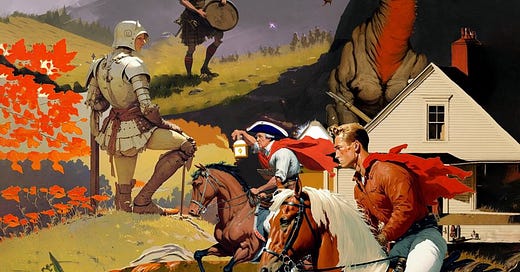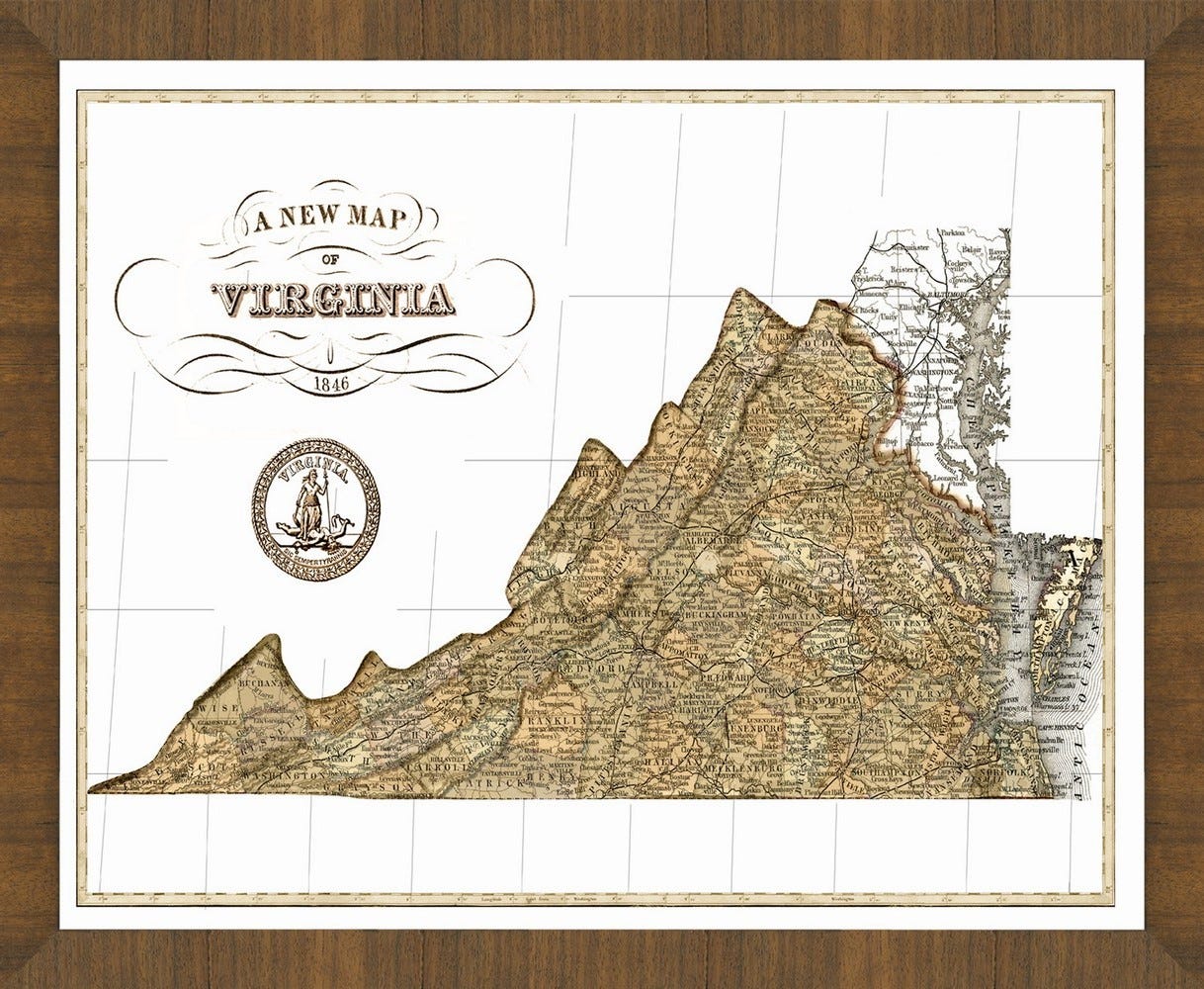The Old Dominion, Mother of America: A Review of Paul Fahrenheidt's "A Country Squire's Notebook"
The Arbo Files
The first English settlers in North America established their civilization in two lands: New England and Virginia. At the sake of over-simplifying things, Puritans and other Protestant dissenters made their homes in New England, while those seeking wealth, either via tobacco or privateering adventures against the Spanish, settled in Virginia. New England became the land of town meetings, witch hunts, and an exacting political culture imbued with religious zeal. Virginia, on the other hand, established a New World aristocracy brimming with the Cavalier spirit and a well-defined, stratified society that harkened back to the medieval days of Merrie Olde England. For much of this country’s early history, there was a spiritual war for supremacy between the civilizations of New England and Virginia (Virginia being the avatar of the South in general). This war only ended with a resounding New England victory in 1865. An America under the thrall of a Massachusetts imperium continues to groan.
But not all that is “done” is final. Indeed, the once defeated can have a second life. The Neo-Assyrian Empire lasted almost three hundred years following the collapse and conquest of other Assyrian states. The same story happened to the Greeks (Mycenean civilization falling ahead of the Archaic sea colonies), the Babylonians, and others. Could it happen for the Virginians?
A Country Squire’s Notebook by Paul Fahrenheidt envisions a future wherein the Old Dominion is all that is left of the United States. Fahrenheidt, a prolific online personality with his own SubStack and podcast, writes with the panache of an Early Republic chronicler. The book’s title and general feeling rings true to Washington Irving, one of the first American authors to break free from the confines of English imitation. A Country Squire’s Notebook is a short collection of seemingly unconnected stories interspersed with sketches of Francophone Catholics wandering through Virginia in search of churches and the bones of one Gideon Macon, the erstwhile other of A Country Squire’s Notebook.
One learns early in this text that Virginia is not the same. The Old Dominion in this book is a Christian monarchy (or maybe oligarchy) controlled by the old landed families like the Byrds, Carters, and Lees. Confederate generals Robert E. Lee (“Marse Robert”) and Stonewall Jackson (“Jack Stonewall”) have become gods worshipped for their supernatural abilities, while NASCAR legends like Richard Petty and Dale Earnhardt have also entered the pantheon, albeit as more minor deities. A Country Squire’s Notebook is not CSA apologia. Rather, it is a lovingly-crafted paean to Virginia and the characters and culture of America’s Southron civilization. Above all else though, Fahrenheidt’s work is a new mythology.
In “The Taps of Old Westmoreland,” a Witchfinder from Connecticut travels down the Rappahannock and across the Chesapeake on a special mission. Montross, Virginia, specifically Stratford Hall, has become a den of diabolism, with a coven of witches controlling the entire Northern Neck from its walls. The Witchfinder’s quest is aided by a elderly fisherman with a mysterious aura. The Witchfinder and the mariner do battle with pirates, sea serpents, and, finally, witches in this invigorating tale.
A tale of similar character is entitled “The Dragon of Skyline.” Here, a Mennonite settler takes up a magical sword in order to defeat a wyrm named Geldfang that sleeps atop the Skyline Caves. The Beowulf-like nature of this short story is an obvious reminder of both the German origins of America’s Amish, but also the shared myths between the Germanic peoples (the Continentals and the Anglo-Saxons). Plus, “The Dragon of Skyline” is just a good, ripping yarn.
The longest story in the collection, “The Bard of Staunton,” details a gathering of Appalachian clans, all of them carrying Scots-Irish surnames. The clans engage in a series of games not unlike the Highland Games, albeit with some major modifications. The winner can become the king of the Valleymen clans, if they so desire. Malcolm MacDuff is the story’s protagonist, and despite hailing from a small and insignificant clan from the area near Staunton, he is chosen by the hand of Jack Stonewall to defeat the more powerful MacDonald clan. The peculiarities of Appalachian life are on full display here, from their love to fighting and drinking to their abiding fondness for music.
“Martinsville’s Last Race” describes a rogue scholar who becomes obsessed with racing. As if possessed, the scholar seeks out the ruins of Martinsville Speedway to commune with the old ghosts there. Horse racing begets iron horse racing, as the need for speed continues.
A Country Squire’s Notebook is a slim volume loaded with meaning. Fahrenheidt is an excellent writer who writes in a florid manner than never crosses over into purple prose. The sentiments and qualities of a landed gentleman abound here. Furthermore, this work establishes itself as the new mythology for a new Virginia future. In this way, it is reminiscent of the criminally underappreciated book The Pilgrim’s Digress by T.J. Martinell. In that novel, the other end of Anglo-America, New England, is reimagined as a patchwork of city-states ruled by Protestant councils and defended by bounty hunters with orders to destroy sex robots, pornography factories, and insurgents out to reclaim Yankee-land for progressivism. A Country Squire’s Notebook is not as political or invective as Martinell’s masterstroke, but it nevertheless articulates a new image for America—a localized, regional, and interdependent state of affairs where tradition is both respected and followed.
A Country Squire’s Notebook serves a yet another reminder to this old sack of bones that there are things worth keeping around for. Namely, the new literature, whether dissident, independent, or just too out-of-step for the mainstream, is a shining light (a beacon upon a hill, maybe?) in a culture of darkness. Men like Paul Fahrenheidt and others, who write not for riches nor acclaim but for the necessity of creation, are better at their craft than those getting paid thousands for sub-literate drivel. There is passion and feeling in A Country Squire’s Notebook, and I for one cannot wait for more from Mr. Fahrenheidt.
So, in the spirit of the Old Dominion, break out your smoking jacket, pour out some whisky, and spend the waning light of a winter’s afternoon reading A Country Squire’s Notebook.





